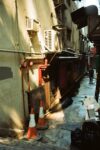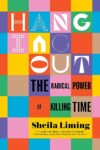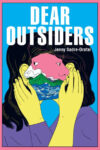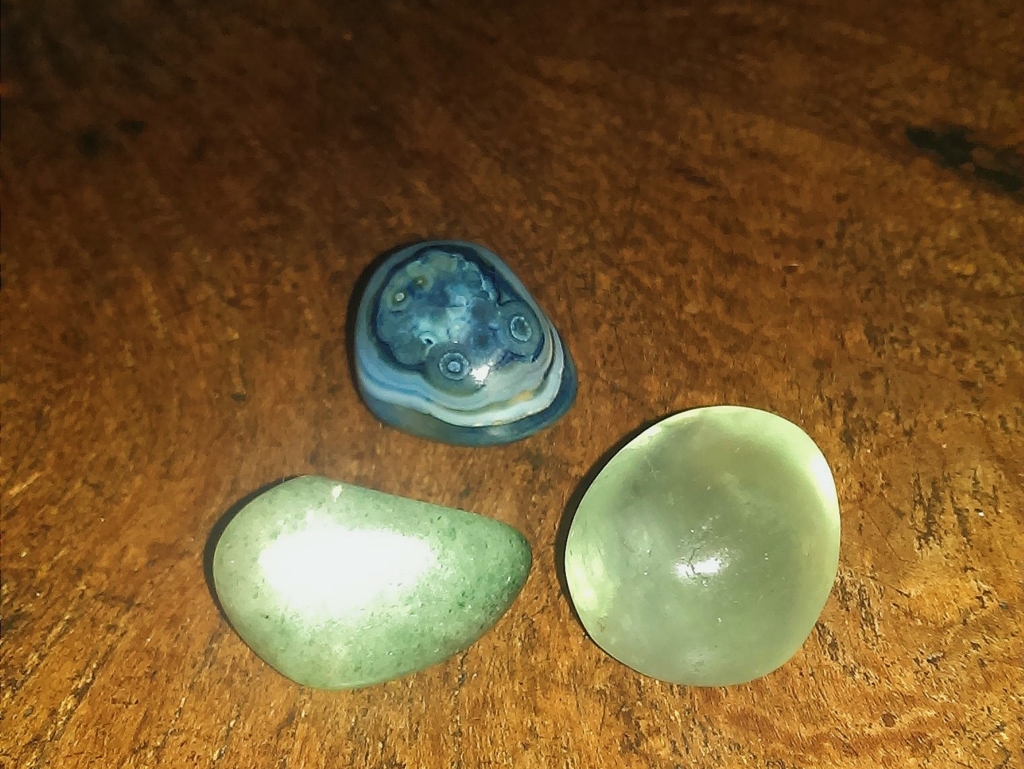
Photo by Hestia Peppe
Some of us go out to the mountains and we drive on a dual carriageway that cuts through coastal villages and towns, out-roaring the sea. Overlooking the road and the sea are battered houses still decreasing in value as I type this, weeks later, in bed at home; behind them rise mountains riddled with old slate mines. I’m a passenger so I get to take in the view. I don’t have a driving license so I’m always grateful to be driven.
To prevent travel sickness as a car passenger you should keep your eyes on the horizon.
We pay twenty pounds each to flail around on trampolines suspended in the depths of an old slate mine: Tourism as literal and physical replacement for industry. In the gift shop I buy three crystals, not mined here, of course, as the engraved slate souvenirs they also sell are, but sold here anyway: aventurine, fluorite and a blue lace agate with formations in it that look like an owl. I give the girl in the shop three pound-coins in exchange.
On the way in to the mine we sign an insurance waiver and don helmets damp with antiseptic spray along with about thirty or so other punters. Friendly stewards brief us on what to expect. “If you see someone crying and shaking then they don’t like it down there: don’t bounce near them.”
The caves are lit in purples, blues and pinks and black-light. Perhaps a hundred feet from floor to ceiling, not as wide as tall. Strung across the space are the trampolines like cubed tents made out of safety netting. Everything is framed by the dark uneven walls of the cave. It’s difficult to tell the difference between people and their shadows in the dim light cast from both above and below. Shapes flicker in and out of rooms and corridors of net. There are shrieks and laughter but the sound bounces off the walls and distorts.
Once we step inside the nets, we lose all sense of context or orientation. We climb up three levels of reinforced netting ‘ramps’ and find ourselves on an unstable sea, a single net, separating us from a drop of perhaps eighty feet. It’s a lot more unsettling than I expected it to be. Every movement from any other visitor spreads out in waves and rocks me. Perhaps this is what the elastic surface of water feels like to a pond skater. There’s no horizontal stillness, and stability is replaced by fluidity. It’s only when we finally brave the ‘slides,’ tubes of netting lined with nylon fibres like bizarrely functional Eva Hesse sculptures that one can jump down to descend through the levels of suspension, that any sense of coherent three dimensions returns. The fall is fast. Gravity takes over and it’s a huge relief. We become wild and exhilarated and we climb back, through a spiral web, to the top, lie in the nets and breathe deep, hearts quickened, before beginning to play like we mean it.
When our hour elapses we make our way, on unsteady legs, out of the mine — a bubble in the clear, bright dark horizon and into the autumn sky. The new moon has risen.
To take the train alone, two hundred and fifty miles and back, costs the same as five people travelling together in a car.
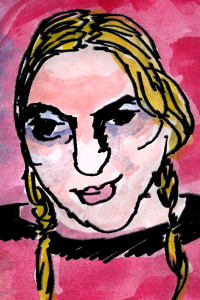
Hestia Peppe’s current column at Full Stop is concerned with horizons, perspective and place. The specificity of viewpoint and context provide the basis for a practice of receptive and observational writing fully situated and alive to that which limitation renders possible.
So many people left town this year.
I’m typing because I can just about afford to. Text is the art form with the smallest overheads and this screen is the only space I can hold. The houses I can see from my window increase in value as I stare at them; they earn more than I do at my day job. Back here in London, the net I’ve strung is so thin that I can always see the bad maths of austerity and housing crises and neoliberal financial structures showing through — the drop below.
I meet this girl at a friend’s birthday drinks and she lives in Cornwall and she says that if you move out from London with good degrees and shit they give you all the jobs. She’s trying to reassure me but I’m freaked out. To leave London would be to be always still marked by it, to still have recourse to the force of it. I keep telling this same story trying to work out what I mean by it, and it’s burning me out.
Someone asks, ‘why stay though?’ and I say ‘because not everyone can leave.’ Perhaps I really mean because I can’t or because I still got bright lights addling my brain and really I don’t want to give up but it sounds truer when I say it than when I think it and I suddenly feel like my analysis is ok.
Stay or go, what’s done isn’t what makes the difference in the end but for the fact that the amount of agency one has in that choice maps directly onto class, social capital and money. Maybe more so on this tiny overpopulated island where land rights have so long been defined by capital. Since they criminalised squatting there’s no formal way to relate to place except through the infrastructures of property. Those worst off can’t afford to leave, whether they like it here or not.
When there’s there’s no horizontal stability, constant movement is required in order to stay upright. What becomes of resistance if existence has to be elastic?
The nets keep me from crashing to my death, allow me to abandon my obligations to gravity but also prevent me from carrying out intention, from planning a future, from building solidarity with others. A net is not a platform. Under neoliberalism the labour of ‘doing what you love’ is just another post-industrial spectacle.
The I Ching has a hexagram for enthusiasm, Yu, which describes the importance of movement along the line of least resistance, like water through cracks in the rocks: spontaneous movement that begins as thunder, then falls as rain to meet the earth with devotion. These happenings punctuate the passing of time, divide moment from moment and suspend the inhabitants of the landscape in astonishment and narrative. All ritual sacrifices, marks and music making have their origins in this motion, in the same gravity that holds the planets in relation to one another.
The day after we played in the nets we walked up a valley to a waterfall. The whole landscape was carved out by water long before the bronze age, when people first inhabited it. I washed my three crystals and my hands and feet in the cold water, filled up J’s water bottle for us to drink on the way back down.
This post may contain affiliate links.





